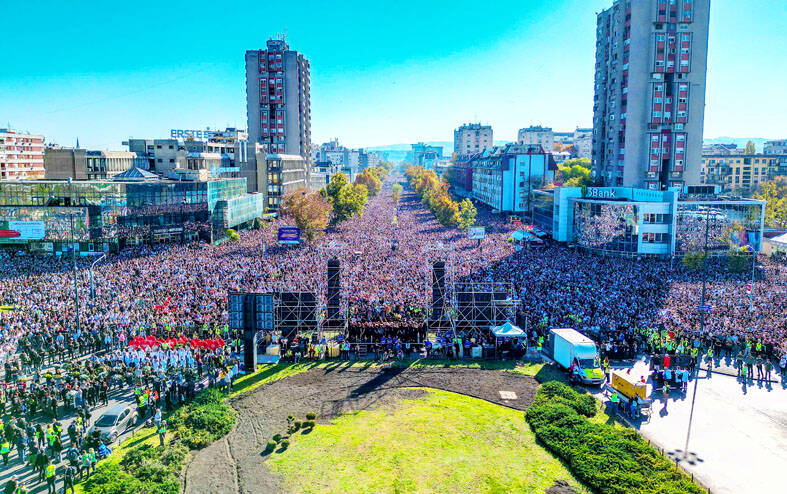Tens of thousands of protesters yesterday poured into Serbia’s second-largest city a year after a railway station roof collapse that killed 16 people, unleashing discontent over alleged corruption and a lack of accountability many blame for the disaster.
Months of protests across Serbia, stoked by anger over the failure so far to prosecute those responsible for the roof collapse have rattled Serbian President Aleksandar Vucic’s long grip on power and raised calls for early elections.
Protesters streamed into the northern city of Novi Sad, where the disaster occurred, in cars, buses or on foot, some having walked long distances, witnesses said.

Photo: AFP
One of Novi Sad’s main boulevards was packed with people.
The protesters — many of them young people — observed 16 minutes of silence — one for every victim — from 11:52am, when the roof caved in following renovation work on Nov. 1 last year.
Protesters held up large red hearts bearing the names of the collapse victims, clutched white flowers and laid wreaths in front of the railway station.
The tearful father of one of the victims, dressed in black, stood for hours staring at his daughter’s name affixed among others to the station’s perimeter fence.
There were no reports of violence, which had marred some protests during the summer, when riot police used stun grenades and tear gas to break up rallies.
“This is a major tragedy for the Serbian people. We cannot bring those people back, but we can feel the pain with their families and say that this is enough,” said Sladjana Burmaz, a 51-year-old economist from the central town of Valjevo.
“These people were not killed by accident, their deaths were the result of a poor system, poor politics... Justice would be served if those responsible were held accountable,” she said.
Vucic, in an Instagram post, published a photo of himself in a church holding a candle at a commemoration ceremony in Belgrade for the victims of the disaster.
“Let the names of those killed be a reminder that human life is above any divisions [in society],” Vucic wrote.

AGING: As of last month, people aged 65 or older accounted for 20.06 percent of the total population and the number of couples who got married fell by 18,685 from 2024 Taiwan has surpassed South Korea as the country least willing to have children, with an annual crude birthrate of 4.62 per 1,000 people, Ministry of the Interior data showed yesterday. The nation was previously ranked the second-lowest country in terms of total fertility rate, or the average number of children a woman has in her lifetime. However, South Korea’s fertility rate began to recover from 2023, with total fertility rate rising from 0.72 and estimated to reach 0.82 to 0.85 by last year, and the crude birthrate projected at 6.7 per 1,000 people. Japan’s crude birthrate was projected to fall below six,

US President Donald Trump in an interview with the New York Times published on Thursday said that “it’s up to” Chinese President Xi Jinping (習近平) what China does on Taiwan, but that he would be “very unhappy” with a change in the “status quo.” “He [Xi] considers it to be a part of China, and that’s up to him what he’s going to be doing, but I’ve expressed to him that I would be very unhappy if he did that, and I don’t think he’ll do that. I hope he doesn’t do that,” Trump said. Trump made the comments in the context

SELF-DEFENSE: Tokyo has accelerated its spending goal and its defense minister said the nation needs to discuss whether it should develop nuclear-powered submarines China is ramping up objections to what it sees as Japan’s desire to acquire nuclear weapons, despite Tokyo’s longstanding renunciation of such arms, deepening another fissure in the two neighbors’ increasingly tense ties. In what appears to be a concerted effort, China’s foreign and defense ministries issued statements on Thursday condemning alleged remilitarism efforts by Tokyo. The remarks came as two of the country’s top think tanks jointly issued a 29-page report framing actions by “right-wing forces” in Japan as posing a “serious threat” to world peace. While that report did not define “right-wing forces,” the Chinese Ministry of Foreign Affairs was

PREPAREDNESS: Given the difficulty of importing ammunition during wartime, the Ministry of National Defense said it would prioritize ‘coproduction’ partnerships A newly formed unit of the Marine Corps tasked with land-based security operations has recently replaced its aging, domestically produced rifles with more advanced, US-made M4A1 rifles, a source said yesterday. The unnamed source familiar with the matter said the First Security Battalion of the Marine Corps’ Air Defense and Base Guard Group has replaced its older T65K2 rifles, which have been in service since the late 1980s, with the newly received M4A1s. The source did not say exactly when the upgrade took place or how many M4A1s were issued to the battalion. The confirmation came after Chinese-language media reported